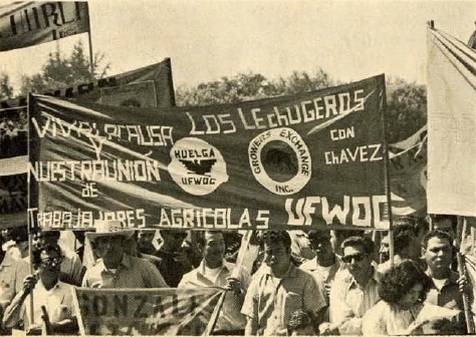On this day in 1970, the largest U.S. farm worker strike in history, known as the "Salad Bowl Strike", began when field workers, organized with César Chávez and the United Farm Workers (UFW), struck, doubling the price of lettuce and costing sellers $500,000 a day.
The UFW had just won the Delano Grape Strike, which had lasted an astonishing five years, winning contracts with dozens of grape growers that were the first of their kind in agricultural history.
The origins of the Salad Bowl Strike lay in a jurisdictional dispute with the International Brotherhood of Teamsters, which had won the right to organize field workers after concluding a successful strike of drivers and packers in the lettuce producing sector in July.
The UFW strongly contested this claim, and, after negotiations broke down, between 5,000-7,000 field workers went on strike. The labor action was not just a strike, but also included mass pickets, boycotts, and secondary boycotts by the participants.
The price of lettuce almost doubled immediately, and the interruption to work cost lettuce growers approximately $500,000 a day. The strike was a bitter dispute which suffered violence and state repression. César Chávez, a leading labor organizer, was jailed after refusing to stop the picketing on court order. On November 4th, 1970 a UFW regional office was bombed.
The strike ended on March 26th, 1971 when the Teamsters and UFW signed a new jurisdictional agreement reaffirming the UFW's right to organize field workers, however jurisdictional disputes between the UFW and Teamsters continued for years afterward. In 1975, the California Agricultural Labor Relations Act (CALRA) became law, establishing the right to collective bargaining for farmworkers in that state, a first in U.S. history.
Megathreads and spaces to hang out:
- ❤️ Come listen to music and Watch movies with your fellow Hexbears nerd, in Cy.tube
- 💖 Come talk in the New Weekly Queer thread
- 💛 Read and talk about a current topics in the News Megathread
- ⭐️ August Movie Nominations ⭐️
reminders:
- 💚 You nerds can join specific comms to see posts about all sorts of topics
- 💙 Hexbear’s algorithm prioritizes comments over upbears
- 💜 Sorting by new you nerd
- 🌈 If you ever want to make your own megathread, you can reserve a spot here nerd
- 🐶 Join the unofficial Hexbear-adjacent Mastodon instance toots.matapacos.dog
Links To Resources (Aid and Theory):
Aid:
Theory:

you'd be dead by now!